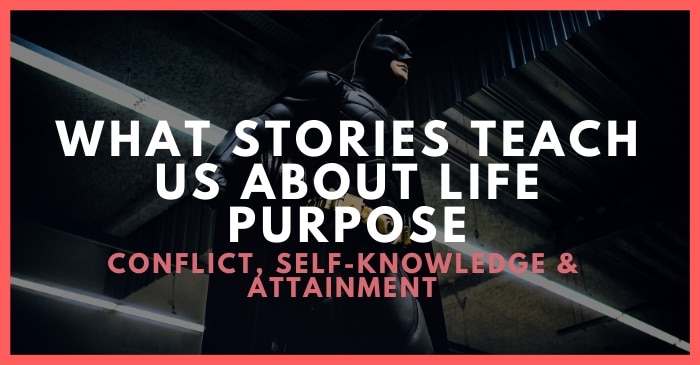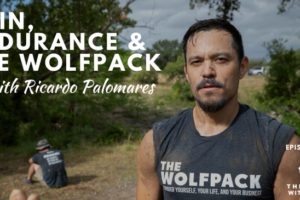This feeling grew when in an effort to become a better writer I began studying storytelling. By watching YouTube videos and reading books on the craft, I learned how to plot, write character arcs and develop conflict. More exciting to me than learning about these writing devices, I discovered that these same mechanics behind how to write a story offered an insightful framework to better understand myself, and how stories are so effective for transmuting important messages.
I think this is why myth and story are still around during an age of science and reason: stories help us understand more about the human experience and life itself. According to Dr. Jordan Peterson in his book 12 Rules for Life, stories tackle a realm outside of the objective, material and scientific world, and tell us about the subjective, psychological, spiritual, personal, internal and intangible nature of reality.
Stories offer us another domain of truth outside of what is physical. From the materialist perspective, the world is made of physical objects. Everything can be explained by measuring the cause and effect of physical phenomena. But when it comes to the subjective human experience, we don’t behave as if we live in a world of things. We act and react as if we live in a story. As if our lives were a drama. Here, the world is a place of action, not of things.
“You see what things mean just as fast or faster than you see what they are.” –Jordan Peterson.
If you suddenly glimpse a snake curled up on the path in front of you, you might jump back and scream. You behave as if the snake isn’t merely a thing. You behave as if it’s something life-threatening. Something meaningful. You extract from a thing its meaning and react to what the thing means to you.
This is why stories aren’t ever merely physical journeys about things. King Arthur doesn’t just pull a sword from a stone. He seeks out and takes control of his destiny. Stories speak to human transformation and the inner-journey of a character’s psyche. A protaganist might move from one physical point to another, but this movement is more so a vehicle for communicating inner-transformation.
Examples like this is why I find stories to be valuable. They house and deliver important messages about life like the difference betweens wants and needs, the value of conflict/struggle, and embodying the hero’s journey to create a more fulfilling life. These messages help us follow our dreams, persevere during difficult times, and embody the hero in order to transform into something greater.
So, let’s get it.
WANTS VS. NEEDS
When plotting a protaganist’s character arc, or his developmental journey over the course of a story, a storyteller must consider two things, says writer KM Weiland: what the character wants and what the character needs.
These are two are very different, inextricably connected things.
A character’s want is typically external and superficial, the tip of the iceberg of a deeper problem. Wants include material or physical possessions (ie. the holy grail or reigning over a kingdom). A want is the character’s explicitly stated goal he announces to the audience and the other characters around him.
A character’s want stifles their growth. The pursuit of this desire causes problems for them and even leads to fatal consequences if they fail to realize and address their limitations. Such is the fate of most antagonists, the bad guy who either remains ignorant or refuses to undergo the necessary internal shifts away from their want. Stories don’t end up so good for them.
What rescues a character from their want is that character’s need. A character’s need is the foundation that’s truly in need of fixing. Whereas the want is merely a symptom of a protaganist’s problem, the need is at the root. Example needs include internal realizations, self-knowledge, purpose and truth.
|
Story
|
Want
|
Need |
|
Pinocchio*
|
Be a “Real” Boy.
|
Free Himself from Temptation.
|
|
Woody in Toy Story**
|
Be Andy’s Favorite Toy.
|
Be Able to Share Andy’s Love.
|
|
Thor**
|
Be King.
|
Learn Humility and Compassion.
|
*Jordan Peterson Example
**KM Weiland Example
This isn’t to say that wants are inherently bad. Wants are incredibly useful because they lead the main character down the path toward realizing their need.
Following our wants and achieving what we need is important. For the hero’s journey, it is a matter of life and death. For us, the stakes are no less significant. We might not have to risk our lives in the same manner, but the journey for everyone is psychological—either to choose to live a life worth living or endure a life of bitter resentment.
ATTAINING SELF-KNOWLEDGE
Psychologically, our lives are no different from our storied friends. As heroes on our own journey, we say what we think we want but it’s unlikely that attaining that want is what’s good for us.
More likely, what we’re really seeking is something higher, deeper, more enduring, anti-fragile, archetypal, and difficult to attain. Rather than accumulating possessions or accomplishments, what would really do us good is transformation. Self-knowledge. Knowing the truth. Such a process requires a hero’s journey into chaos and the unknown.
Confronting the unknown, sorting through chaos, and attaining self-knowledge is a difficult process. In story, it’s painstakingly obvious to an audience what the protagonist actually needs. Meanwhile, the solution constantly evades the protaganist as he digs himself a near-fatal trench. It’s a situation we’re all too familiar with, how easily we see the faults in others while blind to our own. We do so at our own peril.
Another reason attaining self-knowledge is difficult is that everything is constantly changing. Our wants and needs are shifting from moment to moment and year to year. The self is in flux—growing, decaying and adapting. This makes the task of knowing oneself a lifelong and never-ending job.
CONFLICT DRIVES STORY
Without conflict, there is no story. This seems in line with the foundational principle of most world traditions: life is suffering. The Buddha knew this to be true. Christ voluntarily accepts his suffering. Pain is intertwined with growth and cannot be avoided. Every external challenge that lies along the path toward a protagonist’s want exists not to drive the protagonist to failure, but to prod them ever-closer to self-knowledge. Conflict is what drives our story forward.
Conflict is also what makes a story interesting. It’s what makes us interesting. It’s what makes life meaningful. Pain is meaningful, perhaps the most meaningful phenomena, and it’s facing it that gives our lives meaning.
It’s never easy to face conflict. Like Sisyphus, our fate is to forever push boulders up hills. Like Prometheus, we’ve been tied to the earth for birds to devour our insides. We are part of the world. Facing pain and conflict is then part of our job. If story teaches us anything, it’s that the only way out is to accept this voluntarily, to “bear that cross” so to speak, and to embody the hero’s journey.
THE WAY THROUGH
If life calls us to take up a lifelong job of suffering, how do we push forward?
We gather tools to reduce suffering. We follow our wants and uncover our needs. We learn about ourselves and find what is meaningful. We assign meaning and purpose to our life. These efforts are necessary not just to make it through life, but to make life worthwhile and fulfilling. We must embark on the difficult path, avoid the momentary pleasures of temptation and desire—the things we think we want—and set our aim higher to what life demands of us.
This is our job. It’s everyone’s job. The job is pursued at the individual level, but the job is also one that is shared. Joseph Campbell coined the theory of the monomyth, that all stories are the same. This is the Hero’s Journey. We are all heroes with the same mission.
It’s a difficult pursuit. Perhaps the most difficult. One that takes the whole life. But we must take personal responsibility for our journey. It’s a matter of life or death.
Maybe then, self-knowledge, purpose and meaning are not something found at the end of the road. They become the road. Maybe Heaven too is something of our own creation, something that drives us to live out and embody the hero’s journey. And maybe this is what story has to offer us that science and a world of things alone can’t provide us.
May we all create, write and live out our own stories. Your hero’s journey awaits you. 🙂
“There is no real ending. It’s just the place where you stop the story.”—Frank Herbert
This post was influenced by Campbell’s The Power of Myth and Jordan Peterson’s 12 Rules for Life, two books I highly recommend to anyone.





Leave a Reply
I guarantee 100% privacy. Your information will not be shared.